

As a job seeker, you know getting a job isn’t easy. Even with the increase in salary information, thanks to new pay transparency laws, finding a job that suits your talents is challenging.
Now it’s time to start writing your resume, which means deciding if you’ll add optional sections like an objective statement. An objective can add valuable information, but knowing when to include one is tricky. Plus, a career objective is often confused with a resume summary.
We’ll tell you the differences between the two, and we’ll help you write an objective that highlights the best parts of your resume. Whether you’ve found the best resume builder or are wondering where to start, we’ve got the answers you need to write an amazing objective.

First: What is a resume objective? Well, it’s basically a snapshot of your best and most relevant expertise, given the position you’re hoping to snag. The primary purpose of your career objective is to quickly highlight your relevant skills and alignment with the specific company’s values and/or goals.
You want to ensure that any recruiter or potential employer sees why it would be ridiculous not to hire you! Your objective should hook the reader, persuading them to continue reviewing your resume—and, ultimately, shoot you an email or a phone call.
Don’t worry if you’re confused about whether an objective or resume summary is the best choice for your resume. They’re pretty similar, and their contents can overlap quite a bit depending on the applicant, so there’s no need to overthink it! Still, there are a couple of differences to keep in mind if you’re struggling to decide:
If you’re either switching careers or just starting in your field, then an objective statement could be the perfect intro to let employers know you’re the right pick. Resume objectives should stay between two and three sentences and focus on your short-term career goals and how you’re qualified to start pursuing them.
A summary, which is also two or three sentences, usually best fits folks with more experience within their career. This statement summarizes a candidate’s extensive skills and work history. The resume summary could be your ideal option if you want to progress in a career where you’ve already experienced success.

To start, consider whether you need an objective at all. Any stellar resume will fall at a page, and you’ll need to make every bit of space count. So, it’s essential to consider whether your objective will add value to your resume or just waste space.
An objective generally suits those who are entry-level or are changing careers. This statement summarizes a candidate’s most relevant, job-specific skills and identifies why they want to work for a target business.
Adding a resume objective could be wise if you want to break into a new career, show the employer you genuinely desire to work for their business, or resourcefully fill up a little extra white space.
But when should you discard the objective statement entirely?
Keep in mind that, on average, hiring managers spend just over seven seconds reviewing your resume before determining whether they’ll take a closer look. That’s a narrow window, so if your resume errs on the side of generic or bland, omitting it is best.
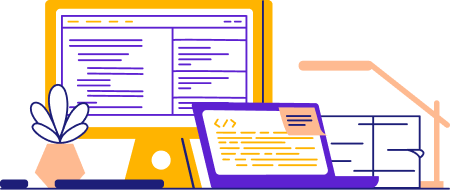
It’s normal to feel overwhelmed, especially if this is your first time writing your resume objective statement. Luckily, seeing samples of how others have handled similar obstacles can help—just remember to inject your personality and make each objective statement as unique as you are. And while comparing others’ statements to your own, ask yourself: “Which of my achievements look the most impressive?”
Plus, we’ve got a fantastic formula for you that will further uncomplicate things:
The process is as easy as X + Y + Z = Eye-catching resume objective!
X = Your characteristics and personality traits
Y = Years of experience and quantified success/results
Z = How these results apply to the specific job role
Keep this formula in mind, and you’ll surprise yourself with professional and engaging results like the objective below:

X = Ambitious, adaptable, eager, self-motivated, and efficient
Y = 2 years of intern experience within the field, learned skills/experience
Z = Technical and soft skills tie in with forging strong teams and client connections
Not sure where to start? Check out these seven tips on how to add the maximum value to your resume objective and launch yourself into the top 20 percent of job applicants who actually get interviewed for a single job:
Don’t worry if this is a little overwhelming at first glance! Many job seekers linearly work through their resumes, but save your objective for last, even though it appears first. Once you fine-tune other sections, it’ll be easier to pinpoint choice details to fill in the formula and complete your perfect objective. (And who says you have to nail your statement the first time you write it?! Go through as many iterations as you need when you outline your resume.)
Bonus points if you tie your personality traits in with the company’s values through skillful word choices! No one wants to read a bland resume objective that doesn’t connect the person with the company—they want to know who they’re hiring.
These strengths could be notable projects or extensive educational background for entry-level applicants or graduates. For anyone changing careers, include successes like past work projects that demonstrate overlapping skills/values with the role you’re currently seeking. Mention relevant certifications in your objective, too!
Details like these may seem inconsequential and even helpful when trying to save space, but they can make your resume too informal. Also, referring to yourself instead of your skills can make it seem like you’re only interested in what the company will do for you.
(Hint: Gauge the company’s tone in its job description and website. You can get away with contractions more readily with informal companies).
Again, resume space is invaluable! Make the most of this real estate by ensuring your objective is long enough to provide eye-catching value but short enough that it won’t get skipped. Save the details for writing a cover letter. Critique it visually, too—how does it look on the page?
Revisit the job listing for crucial skills that match your expertise and leverage that in your objective statement.
Other skilled applicants undoubtedly applied for this same role—so what makes you the right fit? Mentioning why you’re interested in the position and how you’re a good match will help you stand out from the crowd.
Why reinvent the wheel? All our free Google Docs resume templates have space for your objective. Take advantage of a resume template (you can edit the one just below!) already laid out for your specific needs rather than dealing with the frustration of a template breaking because you tried to add one.
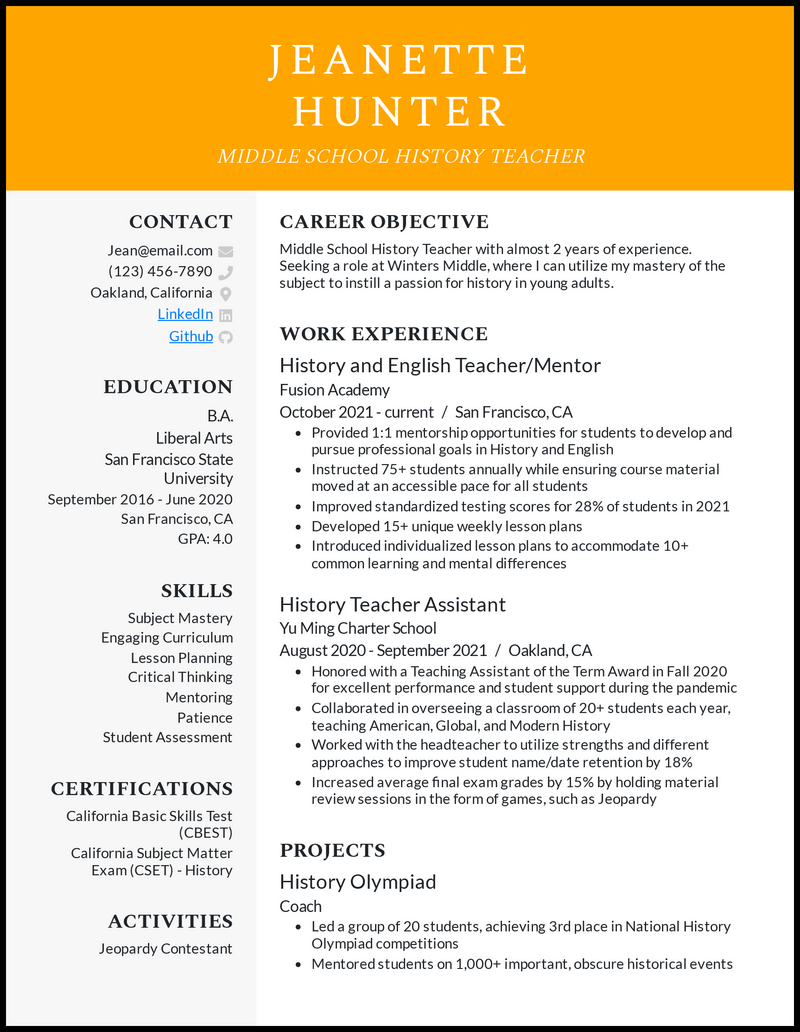
If you’re struggling, remember that starting in the wrong place is a common but avoidable pitfall: many applicants try writing their objective first, only to find they don’t know where to begin. Lessen your stress by drafting the rest of your resume first. Writing a quality resume objective will become easier once your qualifications are laid out on the table.
Since your objective needs to take up so little space, get selective while skimming the cream of the crop from your resume bullet points. What previous roles resulted in your most impressive contributions to a company? Put yourself in the recruiter’s shoes and think of what they’d want in their next hire, then write your objective based on your most dazzling selling points.
Return to our objective samples in this post anytime you need some inspiration. You can also better prepare with a resume outline. Planning out the arrangement of your background and skills will simplify filling out your resume when the time comes.
To give you some examples of what we’ve been talking about, let’s look at a mock job description for a data scientist and compare three resume objective statements to see what passes muster.
Data scientist job description example:
Currently seeking a remote data scientist for Infinity Solars who is self-starting, innovative, and skilled with various data tools to design/create predictive customer behavioral models. Must be able to translate data for all levels of communication to support leadership groups, give team members actionable business insights, and lead machine-learning algorithm development. Must exhibit exceptional critical thinking skills by gauging the effectiveness and accuracy of data quality and mining techniques.
I can definitely talk to people since I just got out of college for biology. I’m good with group projects and know a lot about computers.
Why it’s not a winner: Leave out bland objectives like this one, which lacks the valuable info necessary to justify taking up space. What kind of job is this even for?
I love solar power and could use my background in data analysis to help your company. I’m also a big team player and have plenty of qualifying technical skills.
Why it’s just okay: At least there’s some personality here, although it’s a little informal. This candidate should also specify skills that would benefit the specific company.
Knockout: Check out our example!

Why it’s great: Nice—personality traits and skills that align with the job description! We also see years of experience with well-rounded skills that would benefit the company, presented with compelling and enthusiastic word choices.

Keeping a few general (but not generic!) resume objective statements nearby enables you to customize your resume at any time quickly! Take a look at these general examples and note how to make them specific to you:



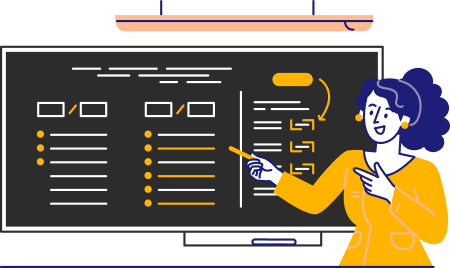
The current stage of your career journey is crucial regarding the tone of your resume objective—a senior-level candidate who’s changing careers, for example, should sound different from a fresh graduate.
See what we mean?
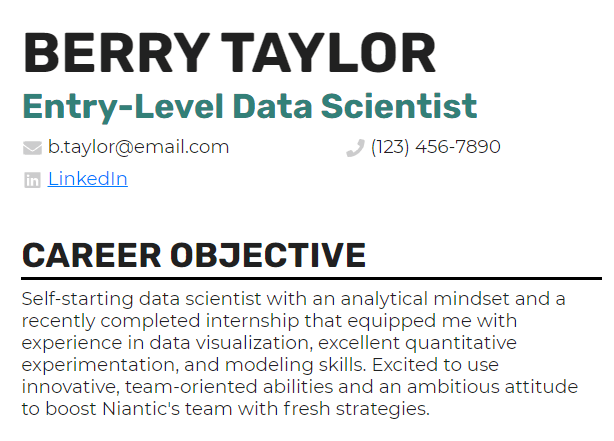






Now that you’ve made it this far, we’ve put together 20 more resume objectives—specific to various professions—so you can see how they exemplify our tips and tricks from earlier!
Accountant resume objective:

Attorney resume objective:

Business analyst resume objective:

Customer service resume objective:

Data analyst resume objective:

Data engineer resume objective:

Data scientist resume objective:

Graphic designer resume objective:

Human resources resume objective:

Nurse resume objective:
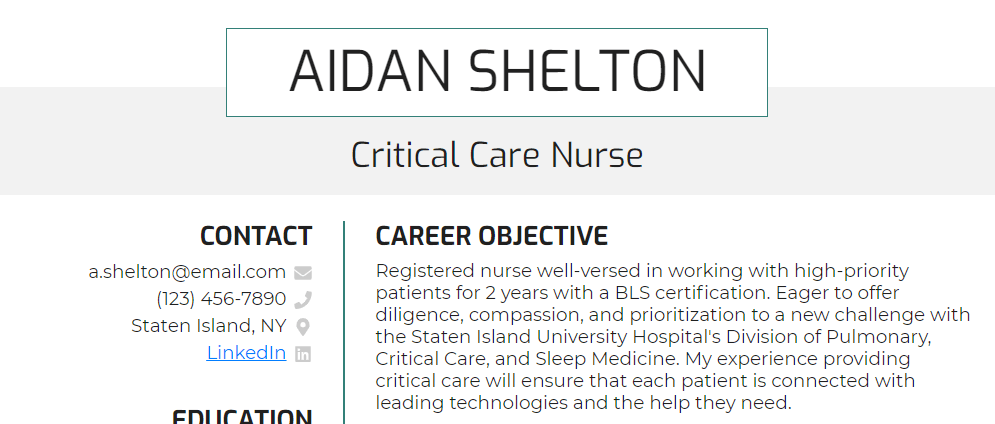
Operations manager resume objective:

Product manager resume objective:

Program manager resume objective:

Project manager resume objective:

Recruiter resume objective:

Sales associate resume objective:

Scrum master resume objective:

Social media manager resume objective:

Software engineer resume objective:

Teacher resume objective:

While you look through these next 30 resume objective samples, imagine they’re tailored to a specific job description—and look for ways you can do the same while writing your own.



















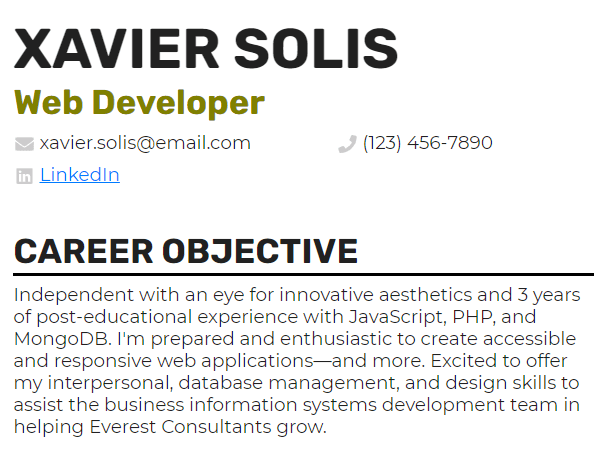











On a resume, your objective is your goal. Where do you want to be in your field, and what qualifying skills, personal traits, or experiences will help you get there? How does the next step in your career journey relate to the job description? How do your professional goals benefit the company you’re connecting with?
2. What is a good objective for a resume?A good objective statement tells readers why you want the job and how you can contribute if you’re hired. Your objective should also forge your first link with the company by connecting over mutual values or goals. You also want to keep things concise and avoid repeating yourself later in the resume: Keep everything fresh!
3. What to put in the objective of a resume?Your resume objective should state that you want the job and then make your reader want to give it to you by supporting your qualifications with a few skills. Connect with the company to demonstrate thoroughness and ambition! If you have an example of how you align with the company or have overcome one of their current obstacles, include it briefly if you have room.
4. How to start an objective on a resume?It’s almost always effective to open your objective with a few skills that demonstrate your understanding of the job. (“Given my background in networking and my extensive knowledge of MongoDB, . . .”).
Then, you can segue into how your skills align with the job description of the company you’re applying to. You can also open with your personal connection to the organization’s values.
5. How long should an objective be on a resume?Your career objective should just be a few concise, skillfully crafted sentences! You don’t want to use too much page space, and you want recruiters to get to your attention-grabbing credentials and experiences quickly. Show your written communication skills by limiting your objective to around 30 to 50 words.
6. What is the purpose of the objective on a resume?The purpose of an objective is to help entry-level candidates (or others with limited experience or a career switch on the horizon) sum up how their personal professional goals align with the company’s. Your objective should express enthusiasm for the core mission of the job role and demonstrate that you’re a strong candidate with examples.
We know it’s easy to get lost amid so many details and tidbits of information: But don’t lose sight of the forest for the trees. Refer to the above objective examples and take inspiration from our 1,000+ resume examples.
And when it’s time to write your resume objective statement, take a step back and don’t forget about our easy formula:
X = Your applicable personal characteristics and traits
Y = Years of experience and/or quantified success/results
Z = How these results (or other relevant and comparable qualifications) apply to the specific job role
This formula will be your resume objective statement’s lifesaver! If you don’t have experience yet, try to balance that out with your previous achievements or character traits that align with the company and its vision—these will show you’re a desirable hire even if you haven’t had the chance to prove it just yet.
Lastly, remember that we have plenty of other helpful tools to ensure the rest of your resume is as stunning as your objective statement! Stop by and check out our resume maker and handy resume tips. You’ve got everything you need to get started—so get ready to let yourself shine!